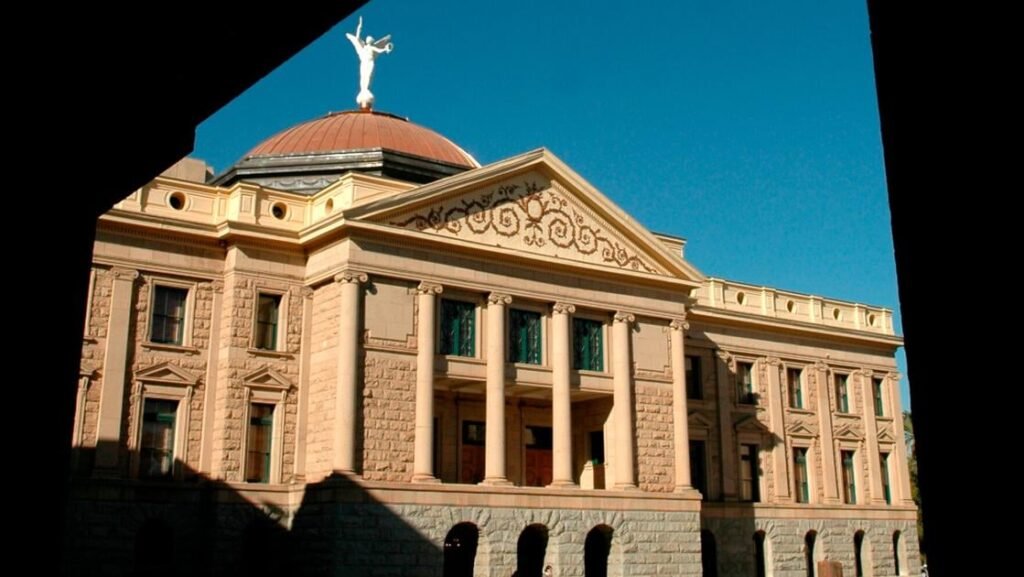PHOENIX — Facing opposition from lawmakers worried that homeowners would be left holding the bag, the Arizona House has agreed to alter a bill backed by power companies to restore the ability of people affected by utility-sparked wildfires to band together to file class action lawsuits.
But the House on Monday rejected additional changes to the sweeping liability shield being sought by electricity providers like Arizona Public Service and Tucson Electric Power. That leaves in place major limits the utilities want on fire victims’ ability to sue utilities for damages they suffer after power lines spark forest fires.
And that leaves the question of whether the legislation is constitutional.
People are also reading…
The revised proposal also tweaks rules for newly required wildfire mitigation plans that public and private electricity suppliers would have to file by eliminating what they got Rep. Gail Griffin to put in her original bill: an automatic approval process. Now, utilities would get that approval 120 days after they file their plans unless changes are requested by state regulators or the public utility’s board.
Potentially more significant, the amendment offered by Rep. Neal Carter removed a provision giving utilities sole discretion for deciding when to turn off power lines during dangerous wind events and that, would have prevented them from being held at fault for not de-energizing their lines. Carter is a San Tan Valley Republican.
But the House narrowly rejected a second amendment from Rep. Alex Kolodin, R-Scottsdale, that would have restored the current rules for lawsuits. He and others argue that the major lawsuit limits that remain in the bill run afoul of the state constitution’s ban on laws removing the right to sue or limiting damages.
The changes became necessary to get the votes for approval.
A majority of the members of the state House killed the initial plan last week after they balked at the sweeping protections from lawsuits in HB 2201.
What’s behind the bill is concerns by APS, TEP, UniSource and other utilities that they could suffer the same fate as major power suppliers in California and Oregon, which faced huge financial hits from lawsuits after entire communities were wiped out by fires started by their equipment.
Although the revised proposal approved on a voice vote by the House on Monday again allows class-action lawsuits, it still provides huge new liability protections for utilities.
It requires anyone seeking to hold a power company liable for damages to provide “clear and convincing evidence” that the utility was at fault.
That is far greater — and harder to prove — than the standard for deciding most civil cases. Under the current standard for almost all lawsuits, jurors weigh the “preponderance of the evidence,” essentially whether it is more likely than not that the person did the act.
It also prevents businesses and homeowners from recovering extra compensation for things like lost income or expenses incurred as a result of a fire. And it rejects any punitive damage awards — awards made to punish and deter intentional behavior — even if the utility ignores its own plans and fails to shut off power during a major wind event.
Kolodin said that’s unconstitutional, and worse, will leave injured homeowners on the hook for losses caused by utilities. He urged fellow lawmakers to approve his amendment, which stripped them out.
“We cannot allow an industry to set its own standard of care any more than we can allow a motorist to have their own definition of reckless driving,” Kolodin said. “With this amendment, utilities will have to continue to keep safety in mind with everything they do, knowing that if their negligence causes one of our constituents’ homes to burn to the ground, or, God forbid, kills someone that they love, compensation will be required to be paid.”
Rep. Justin Olson, R-Mesa, a former member of the Arizona Corporation Commission which regulates utilities, also said the liability limits needed to be stripped out of Griffin’s measure.
“I think that it’s important that if we are passing legislation, that we correct any ? errors in that legislation,” he said. “And from my perspective, I can’t support this bill without the Kolodin amendment that addresses the limiting of the liability and constitutionality of the bill.”
Griffin countered that her bill had broad support from elected officials across Arizona and read a long list of them who back it.
“This is a good bill for fire prevention, and it does cover if the utility is liable, is at fault, they are liable,” Griffin said.
The measure still needs a formal vote in the House before it heads to the Senate for action. It failed on a 28-32 vote last week but with the amendments will get a second chance for the House to formally approve it.
Insurance companies and trial lawyers oppose the measure, which they say will not only limit the ability of homeowners, businesses and cities and towns to recover their losses from utilities but could also force insurers to either greatly raise rates — or stop issuing policies altogether in fire-prone areas.

